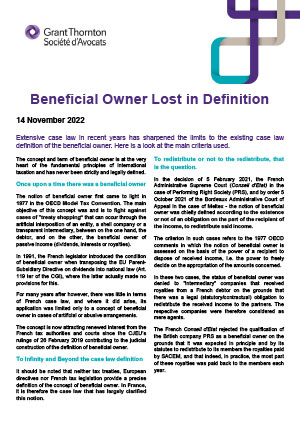-
Pilotage de la politique fiscale
Pilotage de la politique fiscale
-
Gestion de la croissance
Gestion de la croissance
-
Contrôle et contentieux fiscal
Contrôle et contentieux fiscal

-
Structuration stratégique et sécurisée des prix de transfert
Accompagnement à la définition d’une structuration stratégique et sécurisée des prix de transfert
-
Activités à l’international et Business restructuring
Accompagnement au développement des activités à l’international et aux réorganisations opérationnelles « Business restructuring »
-
Contrôles fiscaux en matière de prix de transfert
Assurer la défense des pratiques dans le cadre des contrôles fiscaux et de leur suite
-
Obligations déclaratives accrues et généralisées
Répondre aux obligations déclaratives accrues et généralisées

-
TVA domestique et internationale applicable à vos flux
TVA domestique et internationale applicable à vos flux
-
TVA bancaire et financière, TVA dans le secteur assurance
TVA bancaire et financière, TVA dans le secteur assurance
-
TVA immobilière et droits d’enregistrement (DE)
TVA immobilière et droits d’enregistrement (DE)
-
TVA dans le secteur public et associatif
TVA dans le secteur public et associatif
-
TVA, contentieux fiscal et relations avec l’Administration
Contrôle fiscal, contentieux fiscal et relations avec l’Administration fiscale
-
Règles applicables en matière de facturation
Règles applicables en matière de facturation
-
Problématiques douanières liées à vos flux internationaux
Problématiques douanières liées à vos flux internationaux
-
Obligations déclaratives et d’immatriculation à la TVA
Obligations d’immatriculation à la TVA et obligations déclaratives (TVA, DEB, DES)
-
Taxe sur les salaires
Taxe sur les salaires
-
Autres taxes indirectes
Autres taxes indirectes

-
Le Diag Transmission
Nous vous aidons à anticiper et appréhender votre opération de transmission

-
Stratégie de distribution
Mise en place et structuration de votre stratégie de distribution
-
Digitalisation des activités de distribution
Digitalisation des activités de distribution
-
Relations entre fournisseurs et distributeurs
Gérer vos relations avec vos fournisseurs et distributeurs
-
Politique contractuelle des entreprises
Mise en place et structuration de votre politique contractuelle
-
Contrôle et contentieux en matière de délais de paiement
Contrôle et contentieux en matière de délais de paiement
-
Relations commerciales avec les consommateurs
Organisation et sécurisation de vos relations commerciales avec les consommateurs
-
Droit des données personnelles - RGPD
Droit des données personnelles – conseil en RGPD
-
Baux commerciaux
Un accompagnement dans la gestion et le Contract Management des baux commerciaux.

-
Prestations traditionnelles
Prestations traditionnelles en droit social
-
Santé au travail et qualité de vie au travail
Assurer une plus grande souplesse dans l’organisation du temps de travail et améliorer la qualité de vie au travail
-
Audit du Management des Ressources Humaines
Auditer des prestations de service de la fonction RH au Groupe
-
Ingénierie RH & People Change
Mettre en place des réponses managériales en réponse aux enjeux stratégiques de l’entreprise
-
Gestion de la conformité RH et des enquêtes internes
Gestion de la conformité RH : harcèlement, discrimination et dénonciation…

-
Conseil dans la structuration juridique
Conseil dans la structuration juridique
-
Gestion courante des entreprises
Gestion courante des entreprises
-
Réorganisation d’entreprises
Réorganisation d’entreprises
-
Cession et acquisition d’entreprises
Cession et acquisition d’entreprises
-
Evolution de l’actionnariat – Emission de valeurs mobilières
Evolution de l’actionnariat – Emission de valeurs mobilières
-
Gouvernance et maîtrise des risques juridiques
Gouvernance et maîtrise des risques juridiques

-
Développement d’une politique de mobilité internationale
Développement d’une politique de mobilité internationale
-
Mobilité - Obligations déclaratives des salariés
Coordination des obligations déclaratives des salariés en situation de mobilité
-
Conseil en matière de sécurité sociale
Conseil en matière de sécurité sociale
-
Assistance en matière de droit du travail
Assistance en matière de droit du travail

-
La gestion et l’exploitation de vos portefeuilles de droits
Nous établissons avec nos clients la politique de protection de leurs droits de propriété intellectuelle la plus adaptée à leurs projets.
-
La sécurisation de vos projets : conseil et rédaction contractuelle
Conseil en matière de propriété intellectuelle, de droit de la publicité, politique contractuelle en matière de droit d’auteur et droit à l’image.
-
La défense de vos droits : précontentieux et contentieux
La défense de vos droits : détection des atteintes, précontentieux et contentieux

The concept and term of beneficial owner is at the very heart of the fundamental principles of international taxation and has never been strictly and legally defined.
Once upon a time there was a beneficial owner
The notion of beneficial owner first came to light in 1977 in the OECD Model Tax Convention. The main objective of this concept was and is to fight against cases of "treaty shopping“ that can occur through the artificial interposition of an entity, a shell company or a transparent intermediary, between on the one hand, the debtor, and on the other, the beneficial owner of passive income (dividends, interests or royalties).
In 1991, the French legislator introduced the condition of beneficial owner when transposing the EU Parent-Subsidiary Directive on dividends into national law (Art. 119 ter of the CGI), where the latter actually made no provisions for this.
For many years after however, there was little in terms of French case law, and where it did arise, its application was limited only to a concept of beneficial owner in cases of artificial or abusive arrangements.The concept is now attracting renewed interest from the French tax authorities and courts since the CJEU’s rulings of 26 February 2019 contributing to the judicial construction of the definition of beneficial owner.
To Infinity and Beyond the case law definition
It should be noted that neither tax treaties, European directives nor French tax legislation provide a precise definition of the concept of beneficial owner. In France, it is therefore the case law that has largely clarified this notion.
To redistribute or not to the redistribute, that is the question.
In the decision of 5 February 2021, the French Administrative Supreme Court (Conseil d'Etat) in the case of Performing Right Society (PRS), and by order 5 October 2021 of the Bordeaux Administrative Court of Appeal in the case of Meltex - the notion of beneficial owner was chiefly defined according to the existence or not of an obligation on the part of the recipient of the income, to redistribute said income.
The criterion in such cases refers to the 1977 OECD comments in which the notion of beneficial owner is assessed on the basis of the power of a recipient to dispose of received income, i.e. the power to freely decide on the appropriation of the amounts concerned.
In these two cases, the status of beneficial owner was denied to "intermediary" companies that received royalties from a French debtor on the grounds that there was a legal (statutory/contractual) obligation to redistribute the received income to the partners. The respective companies were therefore considered as mere agents.
The French Conseil d'Etat rejected the qualification of the British company PRS as a beneficial owner on the grounds that it was expected in principle and by its statutes to redistribute to its members the royalties paid by SACEM, and that indeed, in practice, the most part of these royalties was paid back to the members each year.
In consequence, the reimbursement of the withholding tax deducted in France as stipulated by the France/UK tax treaty was not applied at a company level to PRS but only to those members of the company who were UK tax residents, the latter being considered as the true beneficial owners.
In the decision concerning Meltex, the Administrative Bordeaux Court of Appeal refused the status of beneficial owner to a Dutch company Wonga BV which received royalties for the use of the Hartford trademark from its French subsidiary, Meltex. The Court of Appeal’s decision was made on the grounds that the Dutch company had the obligation under a master license agreement with its parent company, Impala World Inc, located in the British Virgin Islands and subsequently in Panama, to pay back in a short time frame almost all the royalties received from Meltex.
In consequence, Wonga BV was not considered as the true beneficial owner and its application for exemption from the withholding tax on the royalties paid by Meltex as provided in the France/The Netherlands tax treaty was rejected by the Court.
Quantum of Scope
In two rulings, of 25 May 2021 for SAS Alphatrad, and 8 February 2022 for Meubles Ikea France, the Administrative Court of Appeal of Versailles focused on a set of indicators relating to the scope of the activity and the operating methods of the company receiving income in order to reject or grant beneficial ownership.
The Court examined the beneficial owner status according to the substance of the recipient company, applying an overlying concept of substance, and more specifically material substance to that of beneficial owner.
In the case of Alphatrad, a French company paid dividends to its Swiss parent company Optilingua Holding, whose sole shareholder was an individual resident in Portugal.
The Court ruled that the Swiss company was not the beneficial owner of the dividends as it could not demonstrate the substantial reality of its management activity having neither human nor material resources of its own.
In this specific case, the absence of any redistribution of dividends to the partner was grounds for an unfavorable ruling as over the same period, substantial advances had been granted to the same individual. Although the company was formally speaking the owner of its income, in fact, its sole partner had free disposal of the company funds.
In Meubles Ikea France (MIF), the French company paid franchise fees of 3% of its net sales to a Dutch company, Inter Ikea System BV (IIS BV), which in turn paid 70% of the royalties received to the Interogo Foundation, owner of the Ikea brand and located in Liechtenstein where it did not pay any direct tax.
In view of the facts in this case, the tax authorities considered, on the one hand, that the Dutch company was not the beneficial owner and, on the other hand, on the grounds of an abuse of rights, that its interposition between the French company and the foundation was exclusively intended to allow the French-source royalties to benefit in a fraudulent manner from the exemption from withholding tax as stipulated in the France/The Netherlands tax treay. This point was particularly highlighted by the administration due to the fact that the Dutch company redistributed 70% of the royalties it received.
The Court however, considered that the Dutch company receiving the franchise fees was not a mere agent but the actual beneficiary of these sums, noting in particular that although it was contractually obliged to pay 70% of the amount of these fees to the foundation, it was actually operating a real activity of its own through its own material and human resources.
The Dutch company had indeed a material substance.
In the light of this case law, the main elements that should be taken into consideration when assessing the beneficial owner of a company receiving passive income from a French source are the following:
- Where the recipient is subject to a legal (statutory/contractual) obligation to repay or redistribute income received, its status as beneficial owner is questionable, notably if such a repayment obligation is for a major part of the income received. However, in cases where human and material resources are present enabling the receiving company to carry out an economic activity of its own and where proof is provided that the fact of repayment is an integral part of the substance of its activity, the company may be able to reverse this situation and be considered as beneficial owner.
- Where the receiving company is not subject to any legal obligation to redistribute the income, this absence of an obligatory redistribution is not in itself sufficient to establish beneficial ownership if it is unable to provide evidence that it (i) has the power to dispose freely of the income and (ii) is not acting as a mere conduit.
- Where the recipient is a holding company, the demonstration of material substance through the existence of its own material and human resources in its country of residence, as well as active involvement in the management of its subsidiaries and/or the exercise of an activity other than that of a mere holding company, are all elements that may be taken into account when assessing the status of beneficial ownership.
In a recent decision of 20 May 2022 in the case of the company Planet, the Conseil d’Etat decided on a question of principle to apply the tax treaty concluded between France and the country of residence of the "true" beneficial owner of the company disregarding the actual presence of payments made to an entity in another country which was considered as the beneficiary.
It should, however, be noted that tax authorities are under no obligation to identify the "true" beneficial owner of a company. This is the responsibility of the company that wishes as either the payer or as the "true" beneficial owner, to benefit from the application of a more advantageous tax treaty with the country of residence of the "true" beneficial owner.
Never-ending story
While the shape of the legal definition of the beneficial owner is becoming clearer, other more grey areas and uncertainties will have to be cleared in the future in order to provide greater legal certainty to taxpayers: how will the anti-abuse mechanisms of both national law and treaties link in to the notion of beneficial owner, how will a strict legal definition fit in with the transposition into French law of the draft ATAD3 directive (see article below) planned for 30 June 2023 at the latest...
















